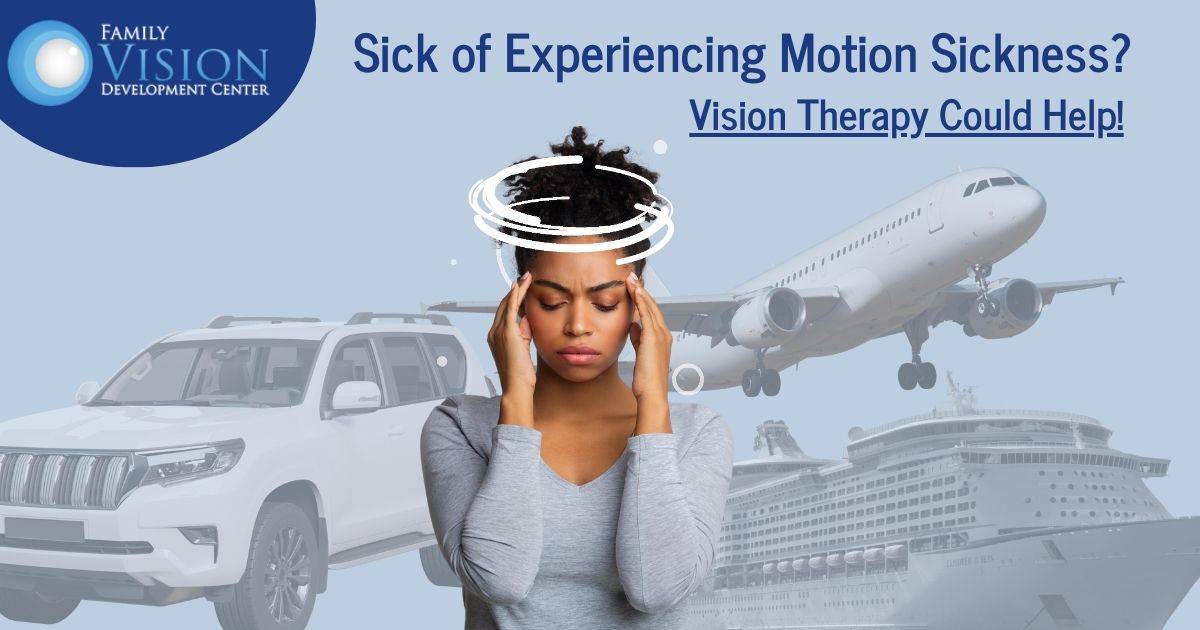Many people experience motion sickness, and it can be very uncomfortable, annoying and disruptive during daily activities. People who suffer from motion sickness often have difficulty with actions such as reading while riding in a car or plane, travelling by boat, looking at stationary objects while in motion, watching oncoming traffic, watching a 3-D movie or riding an amusement park ride. Symptoms of motion sickness can include:
- Nausea and vomiting
- Dizziness
- Headache
- Fatigue
- Cold sweats
- Rapid breathing
- Increase in saliva production
Motion Sickness Connection to Vision
Motion sickness can occur when there is a disconnection between what the eyes see and the signals the brain receives from the inner ear and other sensory systems. When visual input contradicts the body’s perception of motion, it can lead to a sensory mismatch, triggering symptoms like nausea and dizziness.
For individuals with vision issues, this disconnect becomes more pronounced. Conditions such as strabismus (eye misalignment), amblyopia (lazy eye), or convergence insufficiency (difficulty coordinating both eyes to focus on nearby objects) can disrupt the normal functioning of the visual system. When these conditions are present, the eyes may struggle to work together efficiently, exacerbating the sensory mismatch that contributes to motion sickness.
Vision Therapy for Motion Sickness
Vision therapy is a specialized form of visual rehabilitation that retrains how the eyes and brain communicate with each other. It involves a personalized program of eye exercises and activities designed to enhance eye coordination, tracking, and focus. When it comes to motion sickness, vision therapy can play an important role in addressing the underlying visual issues that can contribute to the condition by accomplishing the following goals:
- Strengthening Eye Muscles – Vision therapy exercises often target the muscles responsible for eye movement and coordination. By engaging in activities that promote the strength and flexibility of these muscles, individuals can enhance their ability to maintain visual focus and reduce strain during motion.
- Improving Eye-Body Coordination – Vision therapy also helps strengthen the connection between the eyes and the body’s movements. Activities that enhance eye-body coordination can help individuals adapt more effectively to changes in their visual environment. This can help reduce the likelihood of experiencing motion sickness.
- Enhancing Depth Perception – Conditions like strabismus can impact depth perception, making it difficult for the eyes to work together in perceiving distances accurately. Vision therapy exercises can improve depth perception, allowing individuals to better judge spatial relationships and reduce the disorienting effects of conflicting visual signals.
- Correcting Convergence Insufficiency – Convergence insufficiency, where the eyes struggle to work together as a team, can contribute to eye strain and discomfort during tasks like reading or focusing on nearby objects. Vision therapy can target these issues, promoting more efficient eye teaming and reducing the likelihood of visual discomfort that may contribute to motion sickness.
Family Vision Development Center for Vision Therapy
The team at Family Vision Development Center has advanced training in vision therapy treatment options. If you find that motion sickness is disrupting your daily activities, come in for a consultation so we can determine the best options for you. Each vision therapy program is individualized according to your specific needs so we can target the exact underlying visual issues with the appropriate exercises. Contact us at 630-862-2020 to learn more about the benefits of vision therapy for eliminating the bothersome effects of motion sickness.
Family Vision Development Center is a full-service vision center offering innovative vision therapy services, sports vision therapy services, post-concussive vision rehabilitation, comprehensive vision exams for eyeglasses and contact lenses, management of ocular diseases including glaucoma, diabetes, macular degeneration and cataracts, and a state-of-the-art optical center offering the latest designs in eyewear.

